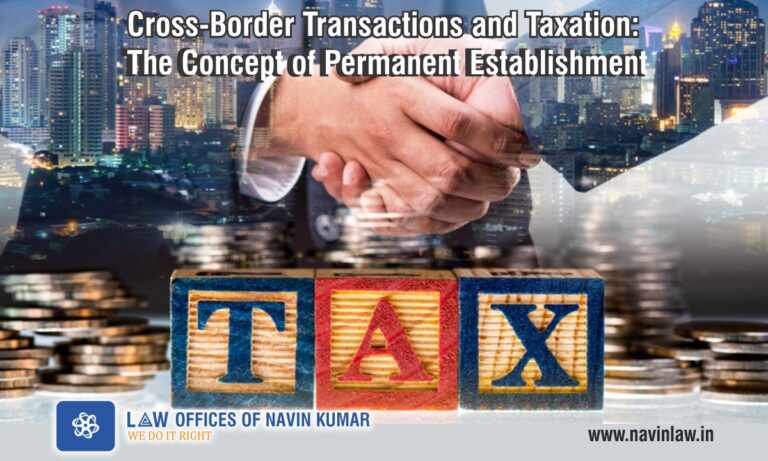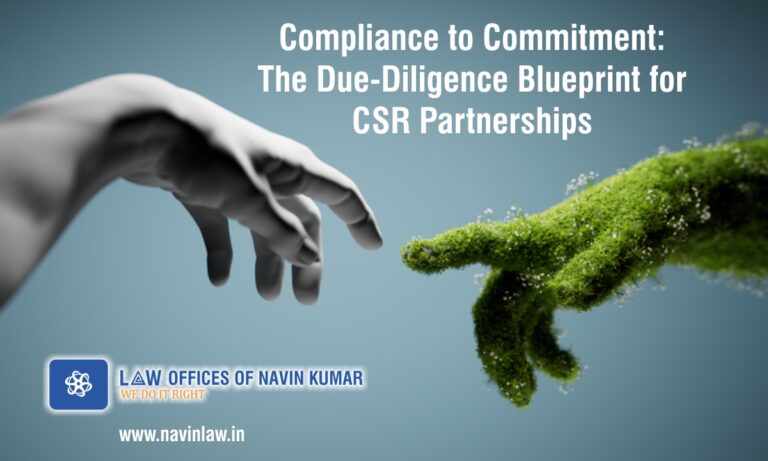
The 21st century has been defined by the omnipresence of multinational corporations operating expansive business empires across diverse time zones. The engine of global economic growth no longer rests upon the monolithic pillars of government-controlled entities; rather, it has shifted towards dynamic, privately-driven multinational enterprises. These corporations have increasingly emerged as the torchbearers of economic progress, leveraging interconnected markets to unlock unprecedented growth opportunities. This evolution has also ushered in a complex interplay between taxation authorities and corporate entities conducting cross-border operations, bringing to the forefront the critical concepts of Permanent Establishment (PE)andDouble Taxation Treaties (DTTs).
ARTICLE 5(1) of the UN Model defines the term “permanent establishment” as a fixed place of business through which the business of an enterprise is wholly or partly carried on. The principal test in order to ascertain as to whether an establishment has a fixed place of business or not is that such physically located premises have to be ‘at the disposal’ of the enterprise. The place would be treated as ‘at the disposal’ of the enterprise when the enterprise has the right to use the said place and has control over it.
OECD (Organisation for Economic Co-operation and Development)commentary on the Model Tax Convention mentions that a general definition of the term “PE” brings out its essential characteristics, i.e., a distinct “situs” and “fixed place of business.” This definition, therefore, contains the following conditions:
the existence of a “place of business,” i.e., a facility such as premises or, in certain instances, machinery or equipment;
this place of business must be “fixed,” i.e., it must be established at a distinct place with a certain degree of permanence;
the carrying on of the business of the enterprise through this fixed place of business. This usually means that a person who, in one way or another, is dependent on the enterprise (personnel) conducts the business of the enterprise in the State in which the fixed place is situated.
The two essential conditions were laid down in “Formula One World Championship Ltd vs Commissioner of Income Tax, International Taxation-3, Delhi and Anr. MANU/SC/0503/2017 :2017:INSC:389: (2017) 15 SCC 602”&“Assistant Director of Income Tax-1, New Delhi v. M/s. E-Funds IT Solutions Inc.. MANU/SC/1331/2017: 2017: INSC:1048 : (2018) 13 SCC 294”:
(a) There must be a specific, fixed, and identifiable physical location in India; and
(b) Such location must be at the disposal of the foreign enterprise for use in carrying out its own business activities.
The Court in Formula One (supra) further held that a PE must demonstrate the three core attributes of stability, productivity, and a degree of independence. Among these, the “disposal test” is pivotal, meaning thereby the enterprise must have a right to use the premises in such a way that enables it to carry on its business activities. The test is to be applied contextually, taking into account the commercial and operational realities of the arrangement.
Philip Baker is in complete agreement with the three core principles of PE as stated above, and he quotes a passage from the judgment of “CIT v. Visakhapatnam Port Trust {CIT v. Visakhapatnam Port Trust, MANU/AP/0033/1983 : (1983) 144 ITR 146]:”
“…the words ‘permanent establishment’ postulate the existence of a substantial element of an enduring or permanent nature of a foreign enterprise in another country which can be attributed to a fixed place of business in that country. It should be of such a nature that it would amount to a virtual projection of the foreign enterprise of one country into the soil of another country.”
Vogel has also emphasized that the place of business qualifies only if the place is “at the disposal” of the enterprise. According to him, the enterprise will not be able to use the place of business as an instrument for carrying on its business unless it controls the place of business to a considerable extent.
It is laid down by the Supreme Court in the case of “DIT (International Taxation) v. Morgan Stanley & Co; MANU/SC/2/50/2007: 200(7) SCC 1” that in ascertaining what would constitute a ‘permanent establishment’ within the meaning of Article 5(1) of the Indo-US DTAA, one has to undertake what is called a functional and factual analysis of each of the activities undertaken by an establishment. It means that mere presence or existence of an entity in India does not automatically constitute a PE; the tax authorities must examine the functions performed, assets used, and risks assumed in India to decide whether a substantial business presence exists so as to attract taxation under the DTAA.
The term “place of business” is explained as covering any premises, facilities, or installations used for carrying on the business of the enterprise, whether or not they are used exclusively for that purpose. A certain amount of space at the disposal of the enterprise, which is used for business activities, is sufficient to constitute a place of business.
In “Commissioner of Income Tax, Punjab v. R.D. Aggarwal & Company and Anr. MANU/SC/0137/1964”, the court highlighted certain essential features of “business connection” as follows:
A real and intimate relation must exist between the trading activities by a non-resident carried on outside India and the activities within India;
The relation contributes directly or indirectly to the earning of income by the non-resident in his business;
A course of dealing or continuity of relationship, and not a mere isolated or stray nexus between the business of the non-resident outside India and the activity in India, would furnish a strong indication of business connection.
Under the OECD (Organisation for Economic Co-operation and Development)and UN Model Convention, the profits of the foreign enterprise are taxable only where the said enterprise carries on its core business through a permanent establishment. It is noteworthy to mention that under Article 5(3)(e), activities which are preparatory or auxiliary in character, even if carried out at a fixed place of business, will not constitute a PE. Article 5(3) commences with a non obstante clause. It states that notwithstanding what is stated in Article 5(1) or under Article 5(2), the term PE shall not include maintenance of a fixed place of business solely for advertisement, scientific research, or for activities which are preparatory or auxiliary in character. Also, it is only so much of the profits of the enterprise that may be taxed in the other State as is attributable to that permanent establishment.
The profits of the enterprise should not be taxed twice, and to resolve these problems, in order to ensure free flow of trade and commerce, countries enter into Double Taxation Avoidance Agreements (DTAAs). The court in“DIT (International Taxation) v. Morgan Stanley & Co. Inc.MANU/SC/2/50/2007: 200(7) SCC 1” discussed in detail with regard to practical operations of DTT Conventions. The object behind the enactment of transfer pricing regulations is to prevent shifting of profits outside India. Under Article 7(2) of the UN Model Double Taxation Convention Between Developed and Developing Countries, 2001, not all profits of MSCo would be taxable in India, but only those which have an economic nexus with PE in India. A foreign enterprise is liable to be taxed in India on so much of its business profit as is attributable to the PE in India. The quantum of taxable income is to be determined in accordance with the provisions of the IT Act.
Under the said article, a PE is treated as if it is an independent enterprise (profit centre) dehors the head office and which deals with the head office at arm’s length. The profits of the PE are determined on the basis of what an independent enterprise under similar circumstances might be expected to derive on its own. Article 7(2) of the UN Model Convention advocates the arm’s length approach for attribution of profits to a PE.
Article 7(1) of the OECD Model Convention is similar to the UN Model Convention; however, the slight difference between the two is well explained in the case of “Oracle Systems Corporation v. Director of Income-tax (International Taxation) and Another. (2016) 383 ITR 434” The UN Model Convention accepts the principle of force of attraction to a limited extent (which the OECD Model does not). The Force of Attraction rules allow the source country (where the PE is located) to tax not only the income directly attributable to the PE, but also other income that the foreign enterprise earns from the same country, even if those transactions were not carried out through the PE.
In “Hyatt International Southwest Asia Ltd. v. Additional Director of Income Tax, MANU/SC/0973/2025” the company stated that it did not have any fixed place of business, office, or branch in India, and that the presence of its employees in India during the relevant previous year did not exceed the nine-month threshold under Article 5(2) of the DTAA. Therefore, the Appellant claimed that it did not have a Permanent Establishment (PE) in India and that its business income was taxable under Article 7 of the DTAA.
The Supreme Court, while rejecting the plea of the company, stated that a detailed review of the SOSA (Strategic Oversight Services Agreements) executed between the Appellant and AHL demonstrates that the Appellant exercised pervasive and enforceable control over the hotel’s strategic, operational, and financial dimensions. The Appellant’s role was not confined to high-level decision making but extended to substantive operational control and implementation. The Appellant’s ability to enforce compliance, oversee operations, and derive profit-linked fees from the hotel’s earnings demonstrates a clear and continuous commercial nexus and control with the hotel’s core functions. The nexus satisfies the conditions necessary for the constitution of a Fixed Place Permanent Establishment under Article 5(1) of the India-UAE DTAA.
The companies who engage in multifarious business across different time zones consider the concept of Permanent Establishment as akin to a bible. The concept of Permanent Establishment serves as the cornerstone of international taxation, balancing the taxing rights of source countries with the protection against double taxation for foreign enterprises. In writings of authors and crucial precedents, a debate with regard to Permanent Establishment seems to be reaching a consensus. Judicial interpretations, including Morgan Stanley, Formula One, and Hyatt International, underscore that mere presence in a country is insufficient; what matters is the substantive business presence, control, and nexus of activities. These rules ensure that multinational corporations contribute fairly to the economies in which they operate while enabling smooth cross-border trade and investment.
This newsletter has been contributed by:
Navin Kumar, Ashish Shukla and Om Swarup Kumar
For further information contact:
Law Offices of Navin Kumar
Email: info@navinlaw.in
Disclaimer: This newsletter is for information purposes only. Nothing contained herein is purported to be or is intended as legal advice and the reader should seek formal legal advice before acting on any information or views expressed herein. Receipt of this newsletter shall not be construed as an attempt to advertise or solicit business in any manner whatsoever. For private circulation to the addresses only.
References:
Formula One World Championship Ltd vs Commissioner of Income Tax, International Taxation-3, Delhi and Anr”. MANU/SC/0503/2017 :2017:INSC:389: (2017) 15 SCC 602
DIT (International Taxation) v. Morgan Stanley & Co; MANU/SC/2/50/2007: 200(7) SCC 1
Oracle Systems Corporation v. Director of Income-tax (International Taxation) and Another. (2016) 383 ITR 434
Director of Income Tax-II (International Taxation), New Delhi and Ors. Vs. Samsung Heavy Industries Co. Ltd. MANU/SC0534/2020
Union of India (UOI) and Ors. Vs. U.A.E. Exchange Centre. MANU/SC/0411/2020
Hyatt International Southwest Asia Ltd. v. Additional Director of Income Tax, MANU/SC/0973/2025





Write a comment ...